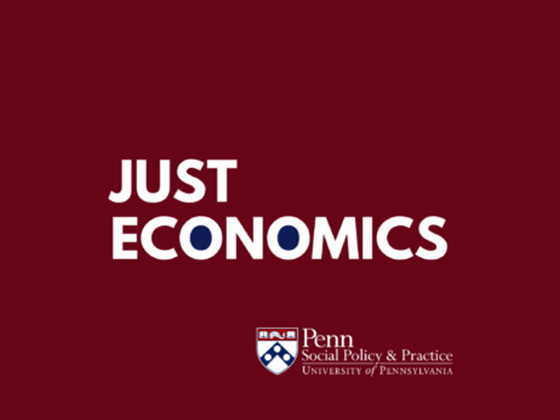News Details
SP2 and Spotify Partner on Innovative Course: Social Policy Through Podcasting

Authored by: Russell Roberts
Faculty & Research
06/14/22
SP2 has added a new partnership to Penn’s ever increasing list of cross-disciplinary collaborations. The School of Social Policy & Practice, in cooperation with Spotify, has launched a pilot podcast called Just Economics, which explores how policies and labor markets work, including the science behind job creation and unemployment insurance. The podcast is hosted by SP2 associate professor of public policy and economist Ioana Marinescu and features a discussion with her colleague Katherina “Kat” Rosqueta, the founding executive director of Penn’s Center for High Impact Philanthropy (CHIP) and adjunct faculty member. In each episode, Marinescu and Rosqueta explore the implications of a guest scholar’s research. Marinescu focuses on policy implications and Rosqueta provides input on the implications for philanthropy. Their hope is to provide evidence that empowers the listener to create a more just world.
“I’m really excited to bring the insights from new economic research to a broader audience. The partnership with Kat Rosqueta and Spotify is a dream come.”
– Ioana Marinescu
The production of the first two episodes of this podcast served as examples for SP2 students enrolled in the new course, Social Policy through Podcasting, co-taught by Marinescu and Rosqueta. In this elective course, 13 students seeking Master of Social Work, MS in Social Policy, and other cross-disciplinary degrees experienced hands-on learning about the role podcasts can play in effecting social change. Additionally, students were taught how to translate economics research for a broader audience by serving as student producers. Students worked collaboratively as a newsroom to produce three episodes surrounded by topics including housing policy, job training, and family leave.
In collaboration with Marinescu and Rosqueta, students selected the topics and guests for each episode, did background research, prepared questions, did post-production, and promoted each episode on social media. Experts from Spotify joined the class as guest lecturers to focus on capabilities needed for effective podcasts including the importance of narrative, editing practices, interview techniques, and podcast-specific marketing.
“We are honored to have been part of this collaboration with the thought leaders of Penn’s School of Social Policy & Practice. At Spotify, we believe that immersive audio and compelling storytelling are powerful means of entertaining and informing our listeners. We are grateful we had the opportunity to work with Penn and their students to provide all of the resources for their production of Just Economics,” said Dawn Ostroff, Chief Content and Advertising Business Officer.
With three pilot episodes completed, Just Economics is ranked in the top ten percent of new podcast downloads across all platforms. The podcast appeals to listeners from varied backgrounds and interests, including economics and the labor market, policies and their effect on change, philanthropy and the role donors can have on social policy, and much more.
In episode one, Inequality, job loss, and unemployment insurance during COVID-19, Marinescu and Rosqueta talk about COVID-related job loss and the effects on unemployment insurance policies. Later, Marinescu interviews Eliza Forsythe, an economics professor at the University of Illinois Urbana-Champaign, about the effects of a pandemic on the labor market and how the United States government’s response has impacted inequality.
Episode two, Child benefits, poverty, and work, focuses on recent evidence on the effects of child tax benefits and their effect on poverty and the labor market. Marinescu then interviews Mark Stabile, an economics professor at INSEAD in France, about the results of his study on what the Canadian child tax benefit can help us better understand the debate on the matter in the United States.
In the final episode of the first season, Political Partisanship and School Desegregation, the issue of political polarization and how policy outcomes are affected is the focus. Race tends to be an important dividing line for partisanship, where white people are more likely to be Republicans and less likely to support racial integration policies, such as busing or affirmative action. Marinescu welcomes Eric Chyn, assistant professor of economics at Dartmouth College to discuss this issue and more.
“As advocates for effective social change, all avenues of information dissemination must be explored. Working in partnership with Spotify, the Just Economics podcast and accompanying course helped us reach a much wider audience to encourage the spread of social innovation, justice, and effective policy.”
– Sara S. Bachman, Dean, SP2
While the partnership for the course is with Spotify, the podcasts are available on a number of platforms, including Apple Podcasts, Google Podcasts, iHeartRadio, Castbox, TuneIn, Podchaser, Listen Notes, Pocket Casts, and Deezer.
People
-

-

Katherina M. Rosqueta, MBA
Founding Executive Director, Center for High Impact Philanthropy
Contact
office: 215.573.7266
Email